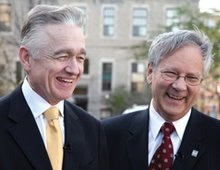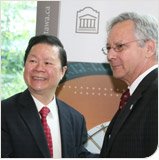by Denis G. Rancourt
 I attended a grand meeting of the Senate of the University of Ottawa today in Tabaret Hall, U of O campus, Ottawa, Canada. The Senate is the highest governing body on all academic matters by virtue of the University of Ottawa Act, 1965. The university was founded in 1848.
I attended a grand meeting of the Senate of the University of Ottawa today in Tabaret Hall, U of O campus, Ottawa, Canada. The Senate is the highest governing body on all academic matters by virtue of the University of Ottawa Act, 1965. The university was founded in 1848.President Allan Rock was absent. VP-Academic Francois Houle (of Anne Coulter fame) presided. VP-Governance Diane Davidson attended by speaker phone from home.
Dean of the Faculty of Science Andre E. Lalonde came into the boardroom before the start of the proceedings just to say hello to me and then left and never came back; despite being slated to present the new Financial Mathematics and Economics Undergraduate Honours Program?
For several months now student member of Senate Joseph Hickey and others have been trying to clarify what the rules of procedure might be. Hickey reports this on his blog about U of O Senate (LINK).
The matter arose in part because Hickey believes that discussion on key points (such as the procedures for rewarding friends of the university administration with honorary degrees) is too often arbitrarily curtailed by the chair or allowed to be curtailed in order to pass items proposed by the administration.
In a previous discussion, when Houle stated that he would arbitrarily invoke Code Morin rules of procedure at will depending on the circumstances but not at other times, Hickey became particularly concerned.
Hickey and student Senate member Martin Schoots-McAlpine have been pressing the administration to state the rules of procedures for Senate.
Remarkably, no one in the institution knew if rules of procedure had ever been adopted by Senate or what the rules might be. A detailed search of the university archives had to be undertaken in preparation for today's meeting.
It appeared today that Hickey is making significant headway towards adoption of the novel idea that "Canada's university" (as the branding slogan goes) would have rules of procedure at Senate.
Davidson reported that the U of O Senate (back to 1930 according to Davidson) has never adopted rules of procedure.
Davidson further reported that she had thoroughly investigated the matter and found that all other university senates in her sample (in Canada) have written rules of procedure (surprise!), based on the Code Morin, Robert's Rules, other codes and often in-house adaptations of existing codes.
We conclude that the U of O really is unique. Hickey takes this to be a sign that there has never been debate at Senate (LINK).
Davidson's stated recommendation to Senate, based on her study, is the status quo - no written rules and the chair (the university president) decides. It's called "established practice" but nobody could remember what the practice had been, not even whether or not rules of order had even been adopted by Senate.
Davidson explained, and this was echoed by Houle, that the procedure has been "consensus". So it appears that the Senate has always been in "consensus" with motions put forward by the administration.
No mention was made to define "consensus" which was said to be the venerable past and now recommended practice. If a majority of student senate members disagree is that "consensus"? If two members who are experts on the matter vehemently disagree is that consensus?
I asked senator Linda Pietrantonio (Vice-Dean of Undergraduate Studies, Faculty of Social Sciences) what this "consensus procedure" was that Davidson and Houle kept parroting. She said "No idea!".
At a next meeting the Senate will attempt to decide (following as yet unknown rules of order) how it will study the possibility of proposing rules of order.
That's progress.




No comments:
Post a Comment